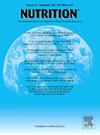Challenges in implementing a multidisciplinary integrative oncology intervention for young women with localized breast cancer
IF 3.2
3区 医学
Q2 NUTRITION & DIETETICS
引用次数: 0
Abstract
Objectives
This study examines the challenges and facilitators in implementing a lifestyle and integrative oncology intervention, which aims to provide education and personalized support related to oncology care, nutrition, rehabilitation, mindfulness, and psychological guidance. Breast cancer (BC) treatment is associated with disabilities among young women with BC, who experience side effects and psychosocial distress that impact their quality of life, physical functioning, and psychological well-being. There is an urgent need to implement multidisciplinary integrative oncology interventions to promote healthy lifestyles and improve the quality of life for women who are about to receive active treatment for BC. Integrative oncology is emerging as a discipline that combines complementary techniques with standard oncology, addressing the individual in all dimensions and encouraging a healthier lifestyle. However, it is essential to conduct studies on implementing and adopting new strategies, such as integrative oncology, in referral centers to evaluate opportunities for effective implementation.
Methods
A qualitative analysis was conducted to identify the challenges and facilitators perceived by patients and providers in implementing a hybrid (on-site and online) integrative oncology multidisciplinary intervention. Women aged 18 to 39 with a recent BC stage I-III diagnosis and providers participated in structured interviews based on the Consolidated Framework for Implementation Research (CFIR) and Reach, Effectiveness, Adoption, Implementation, and Maintenance (RE-AIM) tools. The data from this framework analysis provided insights for developing an effective intervention and helped identify potential barriers and facilitators.
Results
Patients and providers reported that implementing the intervention was challenging, primarily due to time constraints, follow-up requirements, and the need to sustain patient motivation. The hybrid modality enhances motivation and adherence while addressing limitations such as the distance necessary to attend in-person sessions. However, some patients encountered difficulties related to technology and scheduling virtual sessions. Despite these challenges, the intervention proved feasible in assisting patients in maintaining a healthy lifestyle since their diagnosis and throughout their active BC oncology treatment.
Conclusions
Integrative oncology interventions emerge as a strategy to maintain a healthy lifestyle, positively impacting quality of life during BC active treatment, and have gained widespread acceptance globally. However, their routine use and inclusion in BC standard treatment at oncology centers remain limited. This study underscores the importance of providing comprehensive care to YWBC from the outset of their treatment. Overcoming barriers such as patient ideologies, healthcare personnel, geographical distances, scheduling constraints, technological limitations, and institutional support is crucial for delivering this level of care.
对年轻女性局部乳腺癌实施多学科综合肿瘤学干预的挑战
目的:本研究探讨了生活方式和肿瘤综合干预实施的挑战和促进因素,旨在提供与肿瘤护理、营养、康复、正念和心理指导相关的教育和个性化支持。乳腺癌(BC)治疗与年轻乳腺癌女性的残疾有关,她们会经历副作用和社会心理困扰,影响她们的生活质量、身体功能和心理健康。迫切需要实施多学科综合肿瘤学干预措施,以促进即将接受BC积极治疗的妇女的健康生活方式和改善生活质量。综合肿瘤学作为一门学科正在兴起,它将互补技术与标准肿瘤学相结合,从各个方面解决个体问题,并鼓励更健康的生活方式。然而,对在转诊中心实施和采用新策略(如综合肿瘤学)进行研究以评估有效实施的机会是至关重要的。方法进行定性分析,以确定患者和提供者在实施混合(现场和在线)综合肿瘤学多学科干预时所面临的挑战和促进因素。年龄在18至39岁之间,最近诊断为BC I-III期的妇女和提供者参加了基于实施研究统一框架(CFIR)和覆盖面、有效性、采用、实施和维护(RE-AIM)工具的结构化访谈。该框架分析的数据为制定有效的干预措施提供了见解,并有助于确定潜在的障碍和促进因素。结果患者和提供者报告说,实施干预具有挑战性,主要是由于时间限制、随访要求和维持患者动机的需要。混合模式增强了动机和依从性,同时解决了参加面对面会议所需的距离等限制。然而,一些患者遇到了与技术和安排虚拟会话相关的困难。尽管存在这些挑战,但事实证明,干预措施在帮助患者自诊断以来以及在其积极的BC肿瘤治疗期间保持健康的生活方式方面是可行的。综合肿瘤学干预措施作为一种维持健康生活方式的策略,在BC积极治疗期间对生活质量产生积极影响,并已在全球范围内得到广泛接受。然而,它们的常规使用和纳入肿瘤中心的BC标准治疗仍然有限。这项研究强调了从治疗开始就为女青年会患者提供全面护理的重要性。克服诸如患者意识形态、医护人员、地理距离、调度限制、技术限制和机构支持等障碍对于提供这种级别的护理至关重要。
本文章由计算机程序翻译,如有差异,请以英文原文为准。
求助全文
约1分钟内获得全文
求助全文
来源期刊

Nutrition
医学-营养学
CiteScore
7.80
自引率
2.30%
发文量
300
审稿时长
60 days
期刊介绍:
Nutrition has an open access mirror journal Nutrition: X, sharing the same aims and scope, editorial team, submission system and rigorous peer review.
Founded by Michael M. Meguid in the early 1980''s, Nutrition presents advances in nutrition research and science, informs its readers on new and advancing technologies and data in clinical nutrition practice, encourages the application of outcomes research and meta-analyses to problems in patient-related nutrition; and seeks to help clarify and set the research, policy and practice agenda for nutrition science to enhance human well-being in the years ahead.
 求助内容:
求助内容: 应助结果提醒方式:
应助结果提醒方式:


